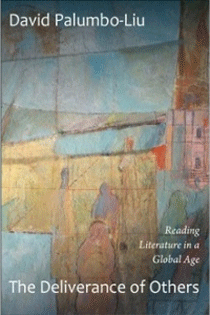By Lewis Fried
David Palumbo-Liu begins by describing a provocative conversation he had about rational choice theory which argues that we can clearly make choices, discerning the efficient and practical ways to realize them, and the ways to multiply them. The theory raises questions about the natures of choices, the challenges of goods in process or the good , the stability of a self, and the role of ethics. Literature offers us a thick description of experience; certainly, a realistic literature makes no apology for this, and Palumbo-Liu pushes his formidable inquiry and sensitivity into this bramble patch. In his words, “I want to look at the various modes of representing and analyzing how humans behave, make choices, express preferences, achieve goals, and assess their place in the world vis-à-vis their goals.”
Taken by itself, this is a large-item task, but possibly not a unique one: It informs many formal and historical studies about reading itself and the history of literatures. But, there are entailments; they are important ones; Palumbo-Liu explores them. Again, I want to quote him: “Put more precisely, this book seeks to delve into the shape, nature, and structure of systems that deliver otherness to us — taking people from ‘different’ worlds and importing them into ours — and analyze those systems when even the most benign and seemingly neutral ones of them actually work to filter out ‘excessive’ otherness for the sake of the functioning of the system.”
As a consequence, The Deliverance of Others delves into the relationship amongst individual, society, cultures, economies, and civilizations. In its ambassadorial role, literature brings both self and “other” before the eyes — and self encompasses both protagonist (as a nuanced, yet complex figure) and reader (as a representative of a given cultural sensibility).
Clearly, literature’s capacity to sink itself into a given character and moment as well as to provoke (if not scandalize) a reader and her equilibrium become topics to pursue. Indeed, can literature in a global age push a self off its axis? Can it threaten the self’s regulatory and regulated life? Is there, can there be, a literature so excessive and shattering that the self is not simply shocked but literally disrupted, and in our own day of extraordinary violence, rapid change, and black swan events? If so, can we re-evaluate our life and our experience, trying to find its shared, if not common, nature with others? In these questions, Palumbo-Liu affirms literature’s ethical nature; we can say its attractive didacticism. We should be reminded of Marx’s down-to-earth line found in Das Kapital, roughly paraphrased as: All this is fine in theory. How does it work in practise?
Palumbo-Liu focuses on several works, each representing a significant collision of self and “other,” each revealing the limitations of, and challenges to, significant form. The Deliverance of Others gives us challenging, sensitive readings of several works, among them J.M. Coetzee’s Deliverance, and Elizabeth Costello; Kazuo Ishiguro’s Never Let Me Go, and Ruth Ozeki’s My Year of Meats. These are well-chosen examples because Palumbo-Liu reads them as expressions of what I want to call the economy of self.
Nevertheless, Palumbu-Liu has a keen eye for the paradoxes of self, and its affect (he treats this last in some necessary detail ). As he points out, his book does not ignore the creation of “sameness” in linkage to “otherness,” as well as their accompanying political and ethical entailments. And this goal leads to the very ethical heart of his study. It’s worth quoting at length, if only because of its resonance and strength as an understanding of humanity in general and in specific. “What is critical here [in this study] is that we exercise our capacity and moral willingness to see others not ‘as they are,’ reduced to some standard data-point calibration…but framed within those precisely those mediating and objective structures that are exposed for what they are — non-natural human-made systems” exposing our own values and politics.
Lewis Fried (ΦBK, Queen’s College, CUNY, 1964) is Professor of English Emeritus at Kent State University and a resident member of the Nu of Ohio chapter of Phi Beta Kappa.




